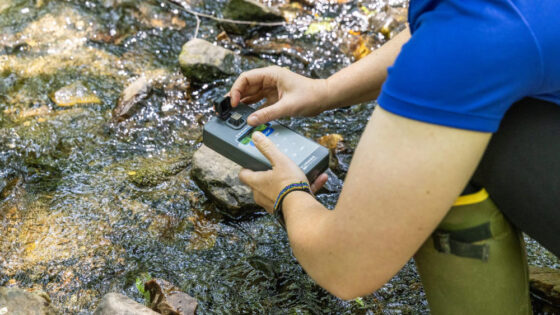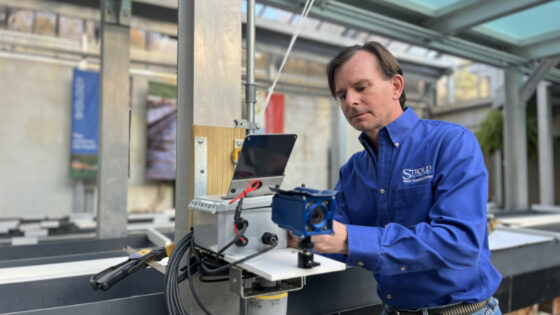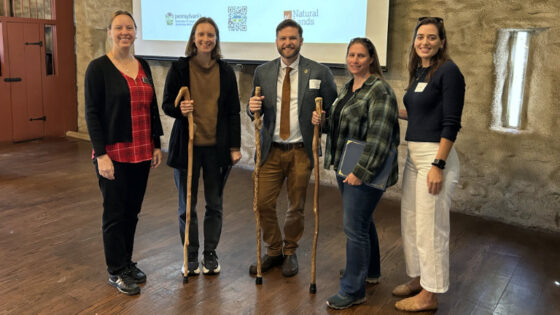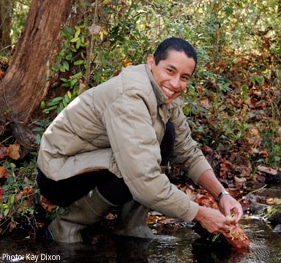
For the 17 biologists, conservation workers, and educators from Costa Rica, Guatemala, Mexico, Peru, and the United States who took part in a total immersion Leaf Pack Ambassador workshop conducted by Stroud Water Research Center scientists and educators, the third week of October was an intense time that holds great promise.
“The Osa peninsula is a really important place for biodiversity but also for water,” said Guido Saborio, scientific director of Amigos de Osa [Friends of the Osa] in Costa Rica. “For us, it’s very important to start to work with kids and to use the Leaf Pack as a tool… to start to monitor the water quality in our rivers and our streams…so they can know the quality of the water right now and how the changes that the peninsula are going through are changing the water quality.”
“The workshop exceeded all our expectations,” said Jamie Blaine, the project’s brain trust. We gained invaluable insights into ways to improve and adapt our popular Leaf Pack Kit for use in Spanish-speaking countries and the tropics.”
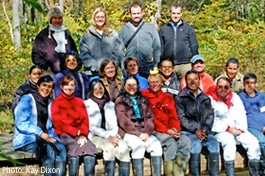
Blaine hopes that the workshop is just the beginning of what he calls a movement. Not only will the program participants—or Leaf Pack Ambassadors—return home with the expressed intention of getting their own communities to engage directly in the protection and monitoring of their freshwater resources, but they will also collectively spread greater awareness of freshwater issues throughout Latin America.
These first Leaf Pack Ambassadors participated in daily lectures by Stroud Center scientists and hands-on “boots in the water” field work to test drive the Leaf Pack Kit and see for themselves the simple and low-cost techniques we can all use to learn about and monitor our sources of fresh water. Stroud educators led the group through a series of activities they have offered for many years to approximately 1,900 individuals annually. Based on methods used by scientists for decades, the activities have been essential tools to aid watershed advocacy groups, volunteers, and teachers, as well as children of all ages, in understanding freshwater issues and equipping them to take action to protect their watersheds and safeguard their water supplies. Until now, these methods — and the Leaf Pack Kit itself — were unavailable to Spanish speakers and had not been vetted for use in the diverse regions of the tropics.
It was an eye-opening experience for everyone involved. Bern Sweeney, senior research scientist and director, addressed the group on the impact of human activity on watersheds, using real-world examples from the participants’ home countries. The visitors learned the basics of tropical stream ecology, got an overview of the research the Stroud Water Research Center is conducting in Central and South America, learned about the role of tropical rivers in the global carbon budget — and even tried their hand at fish dissection to get a firsthand understanding of the freshwater food web at work.
”This program offered us a great opportunity to marry the two disciplines of science and education,” said Kristen Travers, Stroud educator. “The educational value of the program was greatly enhanced for these professionals by incorporating lectures by our scientists.”
Because this was the first experience in the United States for many of the participants, time was included to introduce them to the area — including a day trip to Philadelphia and a visit to the Fairmount Water Works Interpretive Center, a festive dinner hosted by Board Chair Rod Moorhead and his wife Alice, and a graduation evening that featured diplomas and salsa dancing.
The weeklong program was just the beginning of a process that Stroud educators hope will spread Leaf Pack and other teaching and monitoring tools across the globe. The next step: each of the participants will give a similar workshop within six months of his or her return home.
“It was an inspiring event, largely because of the engagement of such a talented and committed group of participants,” said Susan Gill, director of education for the Stroud Water Research Center. “We’re excited about its potential to be a model for engaging citizens in water issues and its ability to spread the Leaf Pack Kit throughout the Americas — and someday the rest of the world.”













